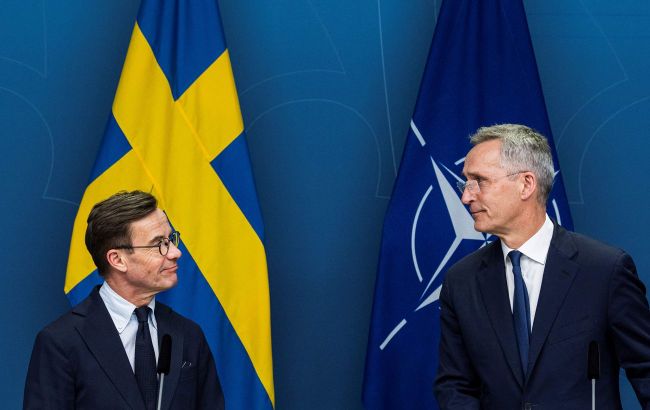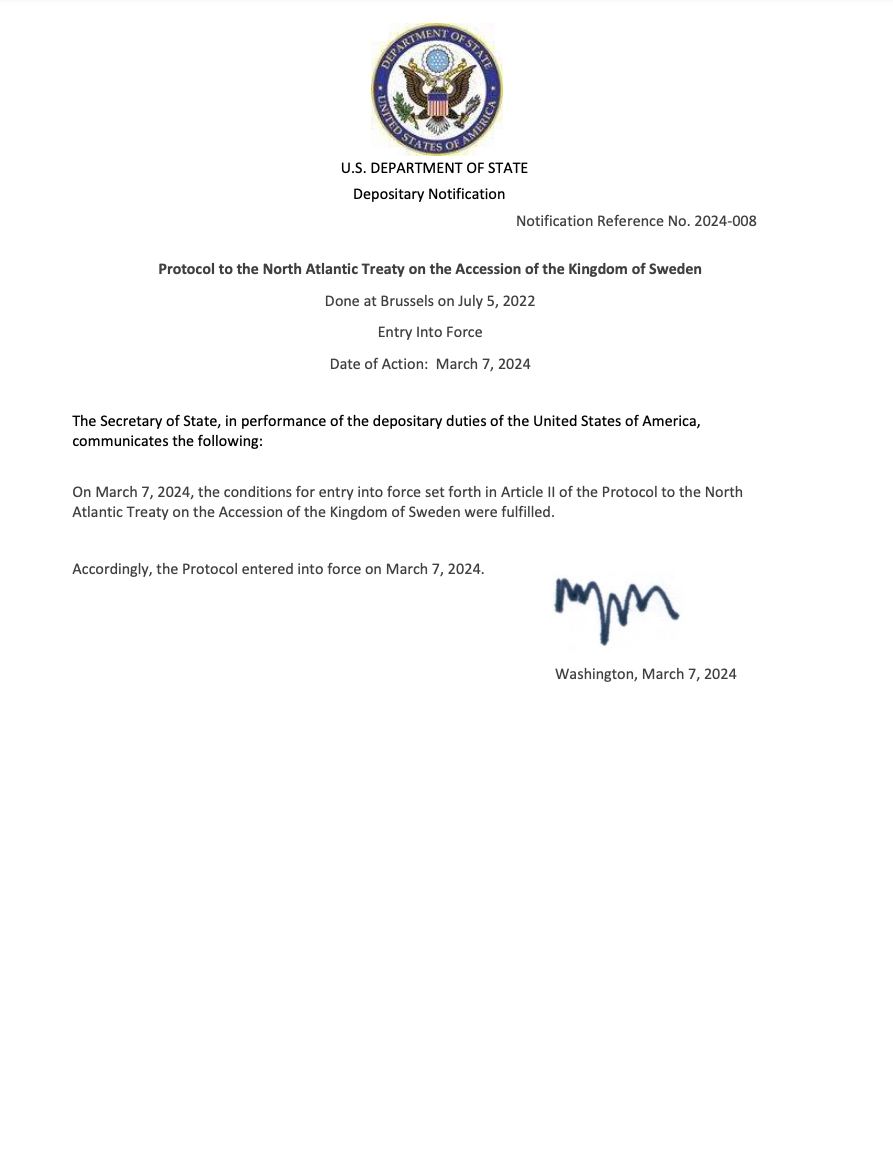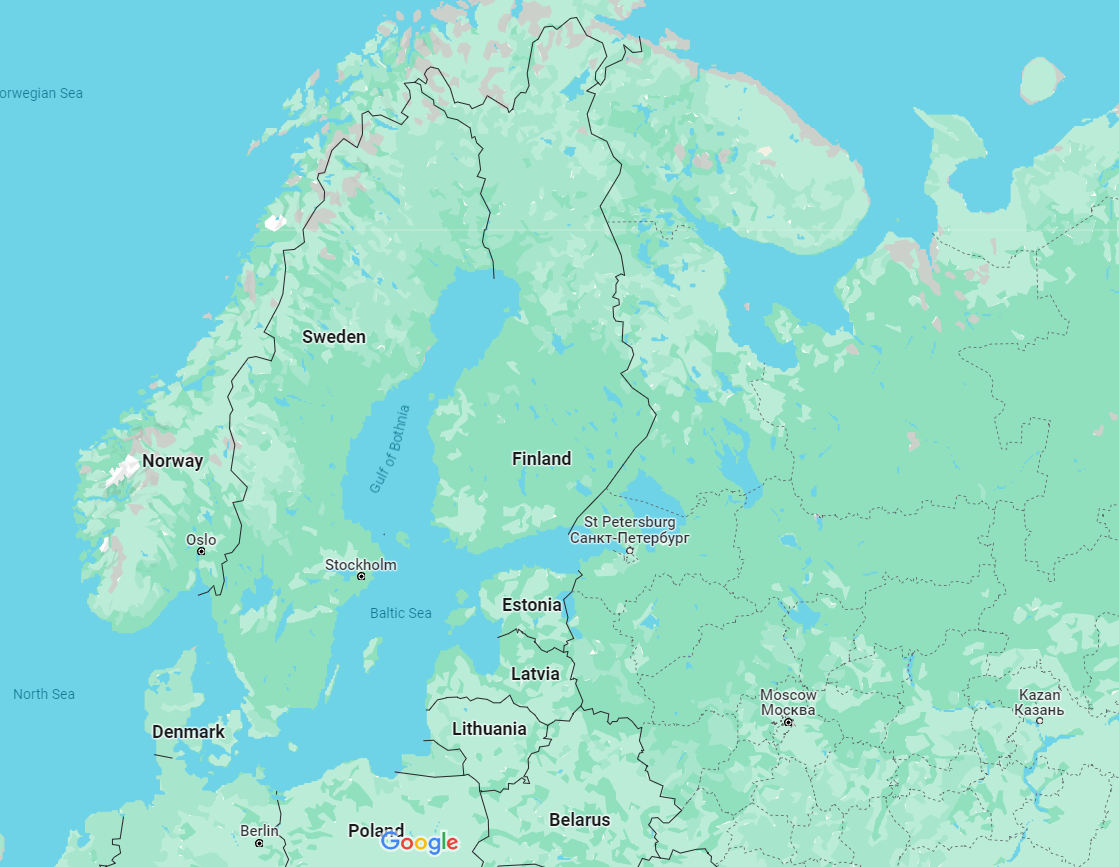Sweden becomes 32nd member of NATO
 Secretary General of NATO Jens Stoltenberg and Prime Minister of Sweden Ulf Kristersson (Photo: Getty Images)
Secretary General of NATO Jens Stoltenberg and Prime Minister of Sweden Ulf Kristersson (Photo: Getty Images)
Sweden officially joined the North Atlantic Alliance today, March 7th. It became the 32nd member of NATO, according to the corresponding protocol published on the website of the US State Department.
The protocol for the country's accession to the alliance has come into force, as reported by the US State Department.

Photo: Protocol on Sweden's accession to NATO (screenshot)
The flag-raising ceremony of Sweden over the NATO headquarters in Brussels is scheduled for Monday, March 11, and Swedish Prime Minister Ulf Kristersson will participate in it.
Key points about Sweden's path to NATO
After Russia's full-scale invasion of Ukraine, Sweden, along with Finland, submitted applications to join NATO. Thus, the countries abandoned their policies of military neutrality, which they had adhered to for decades.
While Finland's accession was relatively swift (on April 4, 2023, Finland became the 31st member of the North Atlantic Alliance), the process for Sweden was delayed due to objections from Türkiye and Hungary.
Later, after a series of agreements, Ankara eventually gave its consent. On January 25, 2023, the President of Türkiye, Recep Tayyip Erdoğan, signed a decision of the Turkish Parliament ratifying the protocol for Sweden's accession to NATO.
Subsequently, Hungary became the last member country of the Alliance to delay the ratification of Sweden's membership. The issue was resolved practically a year later. Recently, Hungary also took the necessary step by finally ratifying Stockholm's application.
Another blow to Russia
As reported in the media, with Sweden's accession to NATO, countries with access to the Baltic Sea, apart from Russia, are now part of the Alliance.
Recently, the Lithuanian Ambassador to Sweden and former Minister of Foreign Affairs and Defense, Linas Linkevičius, warned that the Russian enclave of Kaliningrad would be "neutralized" first if Russia challenges NATO.
"If Russia dares to challenge NATO, Kaliningrad would be "neutralized" first. Russia's previous false accusations that it is surrounded by NATO are now becoming a reality," he wrote on his X account.
 Photo: Sweden's and Finland's accession to NATO will weaken Russia's positions in the Baltic Sea (screenshot from google.com/maps)
Photo: Sweden's and Finland's accession to NATO will weaken Russia's positions in the Baltic Sea (screenshot from google.com/maps)
Today, the Financial Times also noted that now all countries on the coast of the Baltic Sea, except Russia, are part of NATO. This means that the Western defense alliance has practically enveloped the Baltic Sea, which is an important route for Russia's oil trade, where one of its fleets is based.
Russia's interests in the Baltic Sea are both economic and military. In particular, St. Petersburg, which has large oil refineries, sends its export goods through the Gulf of Finland along the bottom of the Baltic Sea. Additionally, in the same Kaliningrad, sandwiched between Poland and Lithuania, the Baltic Fleet and Iskander ballistic missiles capable of carrying nuclear warheads are based.

